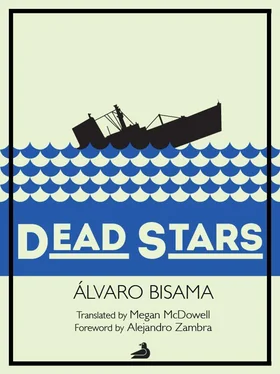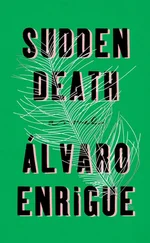You remember Valparaíso back then? she said. I said: Yes, the whole city was in ruins.
I went to see them in that apartment, she said. It was in Quebrada Verde. Half the apartments in the building belonged to the same owner, and the furniture was passed down from one tenant to the next. Several of my classmates lived in that place over the years; from those brick balconies the bay looked miniscule, just a model made of lights that created the illusion it was there within arm's reach. I remember the way Javiera and Donoso had decorated the place: the Vietnamese children, Che, some family pictures of hers, and that painting of a naked woman next to a fetus shaped like the sun. Some art school chick had given it to them at a party. It was horrible. Their furniture was wicker. There was a little TV and a stereo that played Silvio Rodríguez cassettes or salsa records. This was during the time when salsa was popular around the university thanks to those Rubén Blades songs with lyrics about the disappeared. I went over there several times to do homework. We would drink Nescafe and eat scrambled eggs while we listened to salsa, and then I would go back home. They would ask me to stay, but I never wanted to. That was my trick. To go. To flee. To get out of there, go downtown, get on a bus.
I said: I never learned to dance. Sorry, but I never listened to salsa. I hate cumbia and all that shit. I ordered another coffee. She lit her umpteenth cigarette. We weren't going anywhere until she finished talking. She answered me with the hint of a smile. She took a breath. The roof of my mouth burned. I tried to hold on to her every move, as she told me about these other people's lives. You know me, I said. I never learned to dance, I repeated.
The eighties were over; that apartment was their mausoleum. But not just the apartment. The whole campus was the same way. I still remember the architecture. The cement buildings. The wide hallways. The cold classrooms. The lights that didn't work. The almost complete absence of wood. The monumental feeling of it, like an abandoned convent. The distorted silhouettes reflected on the floor, as if the years had turned the tiles opaque. The walls of the bathrooms where the thin coats of paint couldn't cover the graffiti. The images on the walls inspired by Mexican muralists. In those years members of the MIR were still kicking around there, humanists who sold tin trinkets in the halls, dissidents from Trotskyite parties no one would ever hear about again, brothers of dead Front members, people who had been expelled in '73 and were now trying to finish a degree. The university was truly the museum of a revolution that never came, a resistance that had been slaughtered in the trenches. Sometimes I remember that place, I dream about it, about those motionless people in the hallways. Those faces have a statuesque stillness, the stone rictus of a monument, the murky contentment of going nowhere. Does that seem strange to you? Not to me, man. The echo within those walls is the echo of footsteps, someone walking among inanimate objects that send the sound back with chilling clarity. Sometimes those objects move, but it's just reflex. There's no life there. It's only the spasm that animates a fading body, the muscles and nerves that twitch automatically until someone cuts the electricity or wakes from a dream. She said: That's the only way a time machine could possibly work — a voyage to a frozen world, as if the entire structure of the place were set on becoming a theme park, stubbornly insisting on remembering that hour of knives and bombs, the day of the dead, the decade of the dead, the century of the dead. Because it worked, all of it, she said. It all animated the machine. It all gave the place an air of false familiarity. An invisible weight that danced the dance of a predictable mathematics; tapes that repeat the same words, the slogans and shouts in the air from bodies that open and close their eyes, talking to other bodies that do and say the same things because they have no room to do anything else but nod and answer with more of the same. In a way that's all their lives are: speaking in ready-made phrases, imitating something they can never regain, disintegrating into an epic retelling of the past and a life lived dangerously, throwing themselves into the suffering and the fear, into something that disappeared at the exact moment the previous decade ended and all the danger was wiped away, man; like even though we were late to the party and we were denied that vertigo, we were forced to pay homage to the fire, to listen to other people's war stories because that was all we had that they'd let us keep: the stories of other people's battles, she said. That tragedy told like a volatile fable, inscrutable in its commonplaces. Because the past was made of old light, she said. The past was a liturgy that excluded us from its miracle, she said. Because we had no share in the tragedy, and we had no right to ask for anything. When Javiera talked, that's how I felt. I felt like we were left out, like all we could do was listen to her, because she had assumed the duty of telling me, without ever saying so out loud, that our lot was only wooziness and hangover. The time of blood and vertigo was over. Our fate was to sit on the floor and listen in silence to the war stories. And so, when I went to Party meetings, I stayed quiet and listened to the words of others, the slogans of others, the lives of others, she said.
She said: I was never active in the Party. Javiera was the star. Sometimes Donoso would speak up to support her. He referred to her as his comrade. He emphasized "his" in a way that made it difficult to know if he meant it in terms of the Party or something more. The meetings were in a big room at the federation offices. Someone had painted an imitation of a work by Guayasamín on one wall. It was awful. Sometimes I'd stop listening and look at that indigenous man with his face resting in his hands as he stared at the horizon with all the sadness in the world. Some weekends my boyfriend would be home alone and I'd go over to his house. I told my mother I was staying at a girlfriend's. We'd watch VHS movies and then have sex in his parents' bed while they were off at their country house. Then he would ask me how things were going at school. I would tell him: Good. We'd been together since our junior year of high school. Everything's good. Uneventful. That's what I'd tell him. I kept quiet about how tired I felt. I didn't tell him I went to Communist Party meetings, where I would sit without talking, frozen stiff, rubbing my knees with my hands. I didn't tell him about my classmates. I didn't tell him about Javiera and Donoso. I didn't tell him: I went to their house and it seemed so small and so dark I thought it must be impossible for someone to live there, with the cold knocking at their door every night. No. I didn't tell him that. I just stayed with him and acted like everything was normal, like I was still the same person and nothing had changed. I didn't tell him about the indigenous man in the painting, or the stories I'd heard, about a man whose face I'd never seen but whose life I knew by heart they talked about it so often — how he'd fallen, riddled with bullets, in crossfire with the CNI ten years earlier; about how Javiera had told us in the diner that once she thought she'd seen one of her torturers in the street, and she'd sat down on a bench in Plaza Victoria to cry hysterically while the fucker walked away down Condell with his family. I didn't say anything because I didn't understand it very well myself, she said. Because I myself couldn't even repeat what I heard. Because I didn't know what to do with all that, with those brand new but foreign things that were too big for me. Because the world was too big for me, man. When I was eighteen and in my first year of university I felt like the world was too big for me, and women like Javiera made me feel like a kid, they made me feel like I was shit, like there was something I wasn't good enough for and I never even knew what the hell it was, she said.
Читать дальше





![Джеймс Чейз - Safer Dead [= Dead Ringer]](/books/430347/dzhejms-chejz-safer-dead-dead-ringer-thumb.webp)






